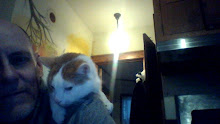Sixty-Eight Statements About Poetry
1 Poetry arises out of the mystery of
language. 2 Poetry is language used in the realm of personal revelation. 3 Poetry
is the most private form of language. 4 And, paradoxically, poetry can be
language at its most communal. 5 The two poles of poetic expression are the epic
(communal) and the lyric (personal). 6 When poetry enters formal speech, formal
speech becomes memorable. 7 The cliché is the enemy of a living, vital, formal
poetry. 8 Poetry is a 'made' thing. 9 The poet is a maker of poems. 10 To read poetry
is to be on the threshold of writing poetry. 11 Poems come out of poems. 12 When it
rains outside, there is a poem inside waiting to be written. 13 The man or woman
who spends his or her life reading poetry knows something special. 14 No one will ever be comforted on their death
bed by material wealth, but poetry might provide succor. 15 When a child
recites a nonsense rhyme, the imagination finds another prodigy of language. 17 When a young lover writes a love poem, the heart announces a new beginning. 18 Poetry can be sad, but it
doesn't have to be. 19 Poetry can be a celebration, an infinite joyful dance! 20 Poetry
is utterly useless, and yet, and yet. 21 Wallace Stevens, famous American poet and vice-president of Hartford Accident and
Indemnity: "Money is a kind of poetry." 22 William Carlos Williams,
famous American poet and pediatrician: "It is difficult to get the news
from poems yet men die miserably every day for lack of what is found
there." 23 Many times the poem is
incomprehensible to the reader because it was first incomprehensible to the
poet. 24 Poetry can be as complex as the
most complex mathematical equations, and then it can be as simple as a pebble
found by one's toe on the beach. 25 Sometimes the most appropriate response to a
poem is a shrug of the shoulders. 26 I have written five books of poetry, yet I
consider myself never to have written a single poem. 27 Beginning is eternal, in
poetry. 28 The turtle isn't a poet, but he is the poet's teacher. 29 The crow isn't
a poet, but he is alert to the poet’s
habits. 30 The sea is a good place for the
poem, as is the desert. 31 When one knows
poetry in two languages, one is doubly blessed! 32 Long before prose forms -- the novel, the
short story, history, philosophy etc. -- there was the poem. 33 When you hear a psalm, you hear poetry. 34 When you hear rap, you hear poetry. 35 When you hear a libretto, you hear poetry.
36 When you hear lyrics, you hear poetry.
37 The ballad, a poem. 38 It is okay not to like poetry, it's okay to hate it,
to find it boring, silly, stupid, it's okay; however, I guarantee there will
come a time in your life when charged language, mysterious language beautiful
language memorable language will move you, will bring you close to
tears: that is poetry, right there, at that instant. 39 Poetry can be about any subject and adopt the
voices of any character. 40 Poetry can be a
mask, a disguise, as when the poet speaks in the voice of a murderer, a saint,
a child, a drunk, a tough guy. 41 The poem can be purely an act of the
imagination. 42 The poem can be a playing
field where language tests itself. 43 Poems
visit the poet when she is least prepared. 44 When you don’t feel like reading poetry, don’t
read poetry. 45 Walking is an excellent
activity for composing a poem. 46 William Wordsworth often wrote poems
while walking, as did Wallace Stevens. 47 Poems used to be a common part of the
personal letter. 48 Cowboys write poetry,
but so do factory workers. 49 Al Purdy
wrote a wonderful poem about a glass of beer. 50 One can start any poem with a
title. 51 For example, you could start a
poem by writing the words “On Poetry” at the top of a page or screen. 52 Poems can be written with pencils, pens,
manual typewriters, computers, cell phones, tongues, mind. 53 Some poets like to collaborate when writing
poems. 54 It is fun, surprising, and it is a technique for beating the loneliness
that writing sometimes requires. 55 Poetry is writing. 56 Poetry is [insert wound here]. 57 Poetry is found
in the love of lemonade, the love of a kitten named Lemonade, and a beautiful
girl seen briefly on a bus reading a book titled “Lemonade: poems by Jon Cone.”
58 The problems of poetry are essentially the problems of prayer. 59 Nothing,
nothing, nothing, nothing, nothing, nothing, nothing, nothing. 60 The question of
poetry’s extinction remains just that: a question. 61 Every society has its own
form of poetry. 62 We encounter poetry much as we do air: whether we want to or
not, we must breathe. 63 The poem is neither daffodil nor hammer. 64 The poem is both
daffodil and hammer. 65 The poem is a form
of simultaneity. 66 Poems meet mystery head-on, by means of an imaginative
elision. 67 Philosophy ends where poetry begins.
68 Whereof we cannot speak, the poem speaks for us.


